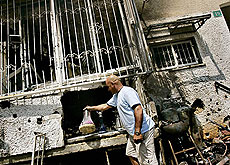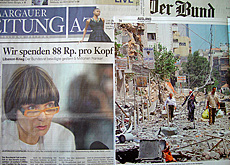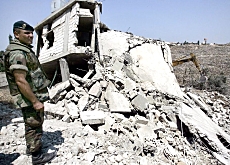Neutrality needs to evolve says ex-diplomat

Former top Swiss diplomat Edouard Brunner says the concept of "active" neutrality promoted by Switzerland in the Lebanese conflict is consistent with past positions.
But he tells swissinfo that the current definition of neutrality should be reworked to take into account the changing nature of war.
By launching a massive attack against Hezbollah militia forces in southern Lebanon, Israel has helped reignite the debate about Swiss neutrality.
On Wednesday, Swiss Foreign Minister Micheline Calmy-Rey told the Le Temps newspaper that Switzerland promotes what she calls “active” neutrality. This position draws heavily on the Geneva Conventions, of which Switzerland is the depositary.
“If the Geneva Conventions are violated, we have a duty, I repeat, a duty to denounce these violations,” she said.
Calmy-Rey added that she believed the Lebanese conflict was between two states.
But a majority of her cabinet colleagues do not share this position, or her concept of neutrality, and refused to accept them last week during a special meeting on the Middle East conflict, at which ministers controversially agreed to adopt a low profile on the issue.
The cabinet has asked the foreign ministry to prepare a report on how to handle neutrality during the conflict in the Middle East. It will also look at the application of international humanitarian law in conflicts where the parties involved are not of equal status.
swissinfo: Does Micheline Calmy-Rey’s “active” neutrality actually constitute a break with the past?
Edouard Brunner: The fact is that that Switzerland has always had an active foreign policy, marked by a strong sense of solidarity. During the Cold War, Switzerland condemned a certain number of events, such as the Soviet invasions of Hungary, Czechoslovakia and Afghanistan. Swiss diplomats also condemned regimes such as South Africa’s apartheid government. This was never considered a problem for our neutrality.
swissinfo: Is this debate about neutrality purely formal or is it something more essential?
E.B.: I get the feeling that most of the Swiss cabinet would rather say less about such a delicate issue as the Middle East. However, I don’t think the foreign ministry has issued any kind of judgement about the ongoing conflict, but about whether international humanitarian law, as symbolised by the Geneva Conventions, has been broken.
On this point, there can be no question of neutrality since Switzerland is the depositary of the Conventions. The Swiss have a right to express their position.
swissinfo: The debate about neutrality has raised questions about whether the conflict involves two states or a state and an armed group. What do you think of this?
E.B.: This conflict is not between two states. Israel is not fighting Lebanon, but Hezbollah. Besides, there are hardly any wars between states nowadays. They have been replaced by conflicts opposing government forces to insurrectionary, secessionist or terrorist movements.
swissinfo: Does this mean that the legal framework of neutrality should be revised?
E.B.: It’s fairly obvious that this new situation where states are no longer fighting other states and nobody declares war means that changes are necessary. Civil wars in Sri Lanka, Colombia, or Iraq, Afghanistan or Chechnya show why. The conflict between Israel and Hezbollah is no different.
But even within these new wars, Switzerland has warned that the participants – be it militias or a state – must also respect humanitarian law.
swissinfo: So is the whole debate about neutrality actually necessary?
E.B.: Criticism began after people thought that the foreign ministry was only judging the Israelis and not Hezbollah. That’s probably what convinced cabinet [last week] it was best to keep a low profile.
Switzerland cannot remain insensitive to the suffering of the Lebanese population. But it has to also show its concern for Israelis under attack from Hezbollah rockets.
At the beginning of the conflict, the Swiss position was not balanced and that’s why the whole debate about neutrality was reignited.
swissinfo-interview: Frédéric Burnand
The country has in effect been neutral since 1515 after Swiss forces were defeated by the French at the Battle of Marignano in Italy.
Switzerland’s neutrality was recognised by the signatory states of the Vienna Congress in 1815.
Neutrality in the international context means the non-participation of a state in armed conflict between other nations.
Swiss neutrality was chosen freely, is permanent and allows the country to be armed for defence purposes.
The former diplomat was born in Bern in 1932 and received his law degree from Geneva University.
He worked for the foreign ministry from 1956 until his retirement in 1997.
He served as state secretary – the number two position in the foreign ministry – as well as Swiss ambassador to Washington and Paris.
He was also the permanent Swiss observer to the United Nations.
He worked as the UN’s special representative for the Middle East in 1991 and later as special representative of the secretary-general for Georgia and Abkhazia in 1994.

In compliance with the JTI standards
More: SWI swissinfo.ch certified by the Journalism Trust Initiative




You can find an overview of ongoing debates with our journalists here. Please join us!
If you want to start a conversation about a topic raised in this article or want to report factual errors, email us at english@swissinfo.ch.